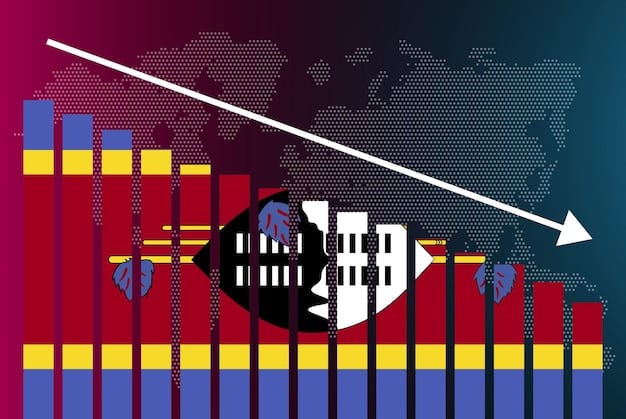The US in the UN: Impact of Reduced Funding and Engagement

The Role of the US in the United Nations: Assessing the Impact of Reduced Funding and Engagement explores how decreased US financial contributions and diplomatic involvement affect the UN’s operations and global influence. This involves analyzing shifts in international cooperation, the UN’s ability to address global challenges, and the overall effectiveness of the organization.
Understanding the role of the US in the United Nations: Assessing the Impact of Reduced Funding and Engagement is crucial in today’s global landscape. A shift in US involvement directly influences the UN’s ability to tackle worldwide issues.
The Historical Context of US Engagement with the UN
The United States has been a pivotal player in the United Nations since its inception. Its involvement has shaped the UN’s agenda, funding, and overall effectiveness. Understanding this historical context is essential to grasping the potential implications of reduced US engagement.
Early US Support and Influence
The US played a key role in establishing the UN after World War II, envisioning it as a platform for international cooperation and conflict resolution. This commitment was reflected in substantial financial and political support.
Shifts in US Policy Over Time
US policy toward the UN has varied across administrations, influenced by domestic political priorities and evolving perceptions of the UN’s effectiveness. Periods of strong support have been interspersed with skepticism and calls for reform.

These factors underline the complexities of the historical context:
- The US has historically been a major financial contributor, influencing the UN’s budget and programs.
- US political support has been crucial in shaping the UN’s agenda and priorities.
- Changes in US administrations have often led to shifts in the level and nature of US engagement.
In conclusion, the historical relationship between the US and the UN is marked by both strong support and periods of tension. Understanding this dynamic is crucial for assessing the potential consequences of reduced US funding and engagement.
US Financial Contributions to the UN: A Breakdown
The United States has historically been the largest financial contributor to the United Nations. Understanding the specifics of these contributions is crucial for evaluating the impact of any reductions. This section breaks down the various aspects of US funding to the UN.
Assessed Contributions vs. Voluntary Contributions
US contributions come in two primary forms: assessed contributions, which are mandatory based on a formula considering national income and population and voluntary contributions, which are discretionary and earmarked for specific programs and agencies.
Key Areas Funded by the US
US funding supports various UN initiatives, including peacekeeping operations, humanitarian aid, and development programs. These contributions are vital for the UN’s ability to address global challenges.

The following points can clarify how US funding is applied:
- Assessed contributions cover the UN’s regular budget and specialized agencies.
- Voluntary contributions support specific programs like UNICEF, UNHCR, and UNDP.
- US funding is critical for peacekeeping missions, providing both financial and logistical support.
In summary, US financial contributions are a cornerstone of the UN’s budget, supporting a wide range of programs and initiatives. Reductions in this funding could have significant implications for the UN’s operations and its ability to address global challenges.
The Impact of Reduced US Funding on UN Operations
A decrease in US financial support can directly impact the UN’s ability to function effectively. This section explores the potential consequences of reduced funding across various UN operations.
Program Cuts and Efficiency Measures
Reduced funding may force the UN to cut back on essential programs and implement cost-saving measures. These cuts can affect the UN’s capacity to address critical global issues.
Effects on Peacekeeping and Humanitarian Efforts
Peacekeeping operations and humanitarian aid efforts, heavily reliant on US funding, could face significant setbacks. This could lead to increased instability and suffering in conflict zones and areas affected by natural disasters.
The potential impacts on UN operations include:
- Scaled-back peacekeeping missions, potentially leading to increased violence and instability.
- Reduced humanitarian aid, exacerbating suffering in vulnerable populations.
- Delayed or cancelled development projects, hindering progress towards Sustainable Development Goals.
In conclusion, reduced US funding can have far-reaching consequences for UN operations, impacting its ability to maintain peace, provide humanitarian assistance, and promote sustainable development around the world.
US Diplomatic Engagement: Its Role and Significance
Beyond financial contributions, US diplomatic engagement plays a crucial role in shaping the UN’s agenda and effectiveness. This section examines the significance of US diplomatic efforts within the UN framework.
US Influence on UN Resolutions and Policies
The US wields considerable influence in the UN Security Council and General Assembly, shaping resolutions and policies on a wide range of global issues. This influence is vital for advancing US interests and promoting international cooperation.
The Importance of US Leadership
US leadership within the UN provides direction and momentum, facilitating consensus-building and effective action. A decline in US leadership could weaken the UN’s ability to address pressing global challenges.
The importance of US Diplomatic Engagement comes down to three key points:
- The US can effectively shape the UN’s agenda and influence other member states.
- Active participation in negotiations helps in forming resolutions to meet desired outcomes.
- Strong leadership encourages other nations to cooperate and contribute positively to the UN.
In summary, US diplomatic engagement is essential for the UN’s ability to navigate complex global challenges and foster international cooperation. Reduced engagement could diminish the UN’s effectiveness and undermine its role in maintaining peace and security.
Potential Geopolitical Consequences of Reduced US Engagement
A shift away from active participation and funding could have significant repercussions on the global stage. This section assesses potential geopolitical outcomes resulting from reduced US engagement in the UN.
Power Vacuums and Emerging Influences
A reduced US presence could create power vacuums within the UN, allowing other countries, such as China and Russia, to exert greater influence. This could lead to a shift in the global balance of power and potentially undermine US interests.
Impact on Alliances and International Cooperation
Reduced US engagement could strain alliances and weaken international cooperation on critical issues. This could hinder efforts to address global challenges such as climate change, terrorism, and pandemics.
Potential consequences might include:
- Other nations stepping up to take leadership roles or filling void that the US left behind.
- Undermining global co-op to work on climate change, counterterrorism, or health crises effectively.
- Change alliances as states seek new partners to counterbalance any reduced U.S. presence.
In conclusion, reduced US engagement in the UN could have significant geopolitical consequences, potentially leading to a shift in the global balance of power and weakened international cooperation. This underscores the importance of carefully considering the potential ramifications of any changes in US policy towards the UN.
Arguments for and Against US Engagement in the UN
There are varying perspectives on the optimal level of US involvement in the United Nations. This section presents arguments both for and against strong US engagement.
Arguments for Continued Engagement
Proponents of continued US engagement argue that the UN provides a valuable platform for advancing US interests, promoting international cooperation, and addressing global challenges. They believe that US leadership is essential for the UN’s effectiveness.
Arguments for Reduced Engagement
Conversely, some argue that the UN is inefficient, bureaucratic, and sometimes contrary to US interests. They advocate for reduced funding and engagement, believing that the US can better pursue its goals through bilateral agreements and other channels.
Here are a few compelling arguments:
- Continued: Fosters worldwide teamwork to tackle problems and promotes U.S. values globally.
- Reduced: Lets resources be used on domestic needs and averts being entangled with red tape.
In summary, the debate over US engagement in the UN reflects differing views on the UN’s effectiveness and its role in advancing US interests. Understanding these arguments is crucial for evaluating the optimal path forward for US policy.
| Key Point | Brief Description |
|---|---|
| 🇺🇸 US Funding | Historically the largest contributor, impacting various UN initiatives. |
| 🤝 Diplomatic Role | Influences UN resolutions and policies, vital for global cooperation. |
| 🌍 Geopolitical Impact | Reduced engagement could lead to power vacuums and strained alliances. |
| ⚖️ Arguments | Varying perspectives on optimal US involvement, balancing interests and efficiency. |
FAQ
▼
Assessed contributions are mandatory payments from member states. These are based on a formula considering national income and population, covering the UN’s regular budget and specialized agencies.
▼
US funding is crucial for peacekeeping missions, providing both financial and logistical support. Reduced support can lead to scaled-back missions and increased instability in conflict zones.
▼
Reduced engagement can create power vacuums, allowing other countries more influence. It may also strain alliances, weakening international cooperation on critical global issues.
▼
Advocates say the UN promotes US interests and global teamwork. US leadership is vital for the UN’s efficacy. These factors point to a sustained role in global affairs.
▼
Reasons include beliefs that the UN is inefficient or against US interests. Some feel the US can better achieve goals through other means. The value of sustained involvement is debated.
Conclusion
In conclusion, the role of the US in the United Nations: Assessing the Impact of Reduced Funding and Engagement reveals a complex interplay of financial contributions, diplomatic influence, and geopolitical consequences. The decisions regarding US involvement in the UN have far-reaching implications for the organization’s effectiveness and the broader global landscape.





